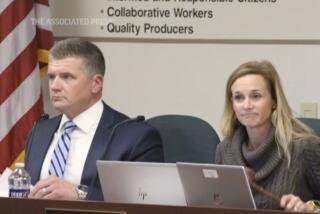Schools Seized in Philadelphia
- Share via
PHILADELPHIA — Students and teachers returning to classes after the holidays are going to find someone new in charge of the schools.
State leaders seized control of the Philadelphia School District at 12:01 a.m. Saturday--setting in motion what experts called the most ambitious reform program ever attempted.
Gov. Mark Schweiker has argued that bold strokes are needed in a district with a $216-million budget deficit, low test scores, chronic teacher shortages and crumbling buildings. Eighty percent of the district’s 210,000 students are poor, and students speak more than 70 languages.
Major elements of the plan won’t be implemented until September.
What changes almost immediately is the governance of the nation’s seventh-largest school district.
A five-member reform commission will replace the eight-member school board appointed by the mayor. The commission--with three members appointed by the governor and two appointed by the mayor--must hire an interim chief executive and decide how to implement Schweiker’s vision.
Schweiker wants to hire Edison Schools Inc., the nation’s largest for-profit education company, to operate dozens of low-performing schools and advise the district’s management.
Among its myriad challenges, the new commission must choose which schools to privatize, determine Edison’s role and reform the finances of a $1.7-billion operation.
The new panel will conduct its business out in the open, said James E. Nevels, the commission’s interim chairman.
“Our goal must be nothing less than the installation of a newly structured, improved education system in Philadelphia by September,” he said.
Opponents are seeking to derail Schweiker’s plans.
A hearing is scheduled for Thursday on a lawsuit seeking to prevent the reform commission from entering into a contract with Edison. Another lawsuit seeks to overturn the 1998 law allowing the state takeover.
The Philadelphia Federation of Teachers also plans to challenge the arrangement.
“We will fight any attempt to replace union-wage jobs with minimum-wage jobs,” said union President Ted Kirsch. “We will be relentless in our criticism if this deal turns out to be . . . a political power grab that leaves kids out of the equation.”
Nationwide, 18 states have seized control of 40 districts, and some places--including Baltimore, Minneapolis and Hartford, Conn.--have tried private management of individual schools.
Edison runs 136 schools with 75,000 students. Its schools feature longer days and school years, heavy investment in technology and a uniform curriculum.
Critics say Edison schools perform no better than public schools, and in many cases perform worse. Edison says its students are typically the most disadvantaged, making comparisons difficult.
Both Mayor John F. Street and Schweiker acknowledged the challenges.
“Improving the quality of education in a large urban center has been a difficult thing to do. Not many districts have been successful in doing it,” the mayor said.
Schweiker said: “We are looking at a set of conditions that are 25 or 30 years in the making. . . . This is not going to be a straight line.”
More to Read
Sign up for Essential California
The most important California stories and recommendations in your inbox every morning.
You may occasionally receive promotional content from the Los Angeles Times.










